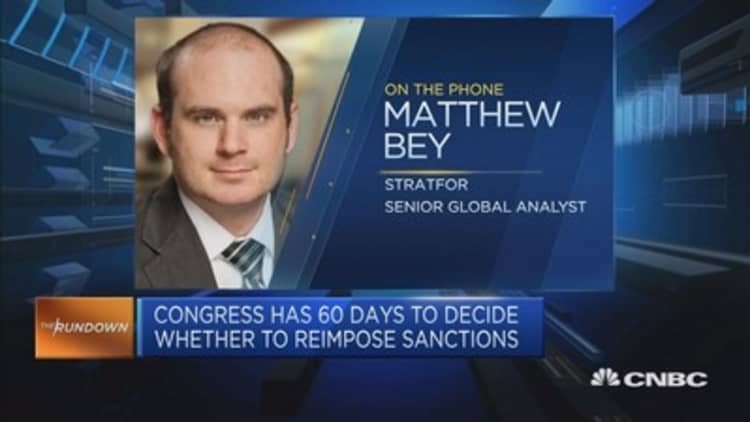President Donald Trump's decision to slap sanctions on Iran's elite Revolutionary Guards is the "exact opposite" of what Washington should be doing if it wants to effect peaceful change in the Middle Eastern country, one analyst has told CNBC.
Trump's decision has forced Iranian moderates such as President Hassan Rouhani and Foreign Minister Javad Zarif to rally around the hardline Guards, said Barbara Slavin, director of the Future of Iran Initiative at the Atlantic Council.
Maintaining Iran's cooperation is crucial to securing its nuclear ambitions and the foreign business deals that were struck when sanctions were officially lifted on the country's economy in January 2016. Companies such as Boeing, Siemens and Total have since established their interests in the once-pariah state.
Losing Iran's favor could have a negative impact on the world economy, too. "Direct confrontation in the Gulf is a major risk to the global oil market, given that 20 percent of the world's oil travels through an Iranian-controlled chokepoint at the Strait of Hormuz," Pat Thaker, regional director for the Middle East and Africa at the Economist Intelligence Unit, told CNBC.
Following Trump's statement Friday, Rouhani said in a televised speech that the Guards "always protected our nation against terrorists." This is a departure from his previous stance on the group, whose dominance in the Iranian economy is a foil against his plans for reform.

Rouhani and Zarif were instrumental in working with international powers to broker the 2015 nuclear deal that led to the lifting of many sanctions on Iran. Trump's rhetoric, and the subsequent show of Iranian unity in response, has "played into the hands of the Guards and other hardliners," Slavin said.
Iran hoping for more foreign investment
Iran, which is struggling to diversify its economy away from oil, has seen a disappointing economic response to the multilateral deal struck in 2015. Foreign investment into the country has "not reached levels expected by the Iranian authorities," Thaker said. Nonoil activity in Iran grew by just 0.9 percent year on year in the first half of 2016, according to the World Bank.
Thaker attributed this to companies being afraid of violating existing sanctions and fearful of further restrictions being imposed in the future. Sanctions on the Guards could make this more problematic as it can be difficult to determine the ultimate ownership of many Iranian companies that are part-public, part-private owned.
The Revolutionary Guards, an elite faction of Iran's military, are considered "one of the dominant forces in Iran's economy," Alireza Nader, senior policy analyst at think-tank RAND Corporation, told CNBC. The exact value of the assets owned by the Guards is unknown, though this is often cited in the tens of billions of dollars, or 30 percent of the country's gross national product, according to a 2016 report by KPMG.

Prior to Trump's singling out of the group, Rouhani had been keen to regulate the business activities of the Guards in order to boost tax revenue and private enterprise.
Iran's Revolutionary Guards started in the construction business after the Iran-Iraq war ruined the country's infrastructure, later growing into a political force safeguarding the Islamic Republic's revolutionary principles. They have business interests in areas from banking and telecommunications to hotels and sports teams.
Analysts CNBC spoke to were divided on the significance of Trump's move. Sanctions on the Guards will have a "major economic impact" on Iran, according to Thaker, who attributes this to the group's embeddedness in the domestic economy. Meanwhile, Nader said that "the Guards are unlikely to be greatly weakened in the long-term. They are a powerful force in Iran and throughout the Middle East."
Thaker did say that much of the investment into Iran so far has come from the deal's other, non-U.S. signatories. "The benefits of Iran's resource-rich economy and fast-growing, well-educated population mean that foreign companies will continue to invest, even if it requires searching for ways around U.S. sanctions," she said.

